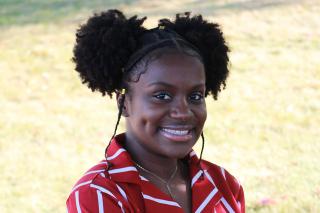Neurobiology major Debora Edouard, who participated in a Research Experiences for Undergraduates (REU) program this past summer, is now receiving training with Scholars Transforming Through Research. During this six-month program, students develop advocacy skills that help bolster undergraduate research in the sciences. Recently, these students met with state representatives to discuss the impact of their research and the need to fund undergrad research.
Last summer, you participated in a Research Experiences for Undergraduates (REU) program doing synthetic biology research. What was it like?
It was a wonderful ten-week experience. I obtained a lot of experimental skills that are very marketable when looking for jobs at laboratories after graduation. REU also provided article reading tips and poster-making advice. We had the opportunity to explore Boston, which was nice. REU showed me that the lab arena does not always have to be competitive, it can be a friendly place where everybody helps one another. This made me inclined to look into more research opportunities. There were only two Simmons students and the other participants were from all over the country.
Tell us about your current work with the Scholars Transforming Through Research (STR): Council on Undergraduate Research's Advocacy Program.
I heard about Scholars Transforming Through Research (STR) from Professor of Physics and Chemistry Jennifer Roecklein-Canfield, who asked my roommate [Grace Solomon] and me to apply. She said that this would be a great opportunity to explore the relationship between science and policymaking and talk to policymakers. I thought this sounded wonderful, and sent in my research abstract with my application, and was accepted into the program.
The participants had an initial in-person meeting in Virginia. There were a few days of workshops that helped us understand why it is important to be able to communicate science to policymakers who may not know a lot of scientific terminology. We also learned how to convey the importance of undergraduate research. We are now participating in several virtual meetings that cover the practical skills needed to prepare our conversations with policymakers. In late April, we will have a Spring Online Showcase, during which we will advocate for paid undergraduate research.
Why did you decide to major in neurobiology?
I've always been interested in the brain and how it works. I am attracted to neurobiology specifically because of how interdisciplinary it is, as it includes chemistry, biology, and aspects of psychology. It is important for me to have a wide-ranging understanding of the sciences, as I plan to attend medical school in the future.
Do you have any current research projects you would like to discuss?
I am studying bacteriophages [or phages, a duplodnaviria virus that infects and replicates within bacteria and archaea] and how they attack certain kinds of bacteria. I work on re-engineering their genome so that they can better attack specific types of bacteria. As more research emerges that antibiotics are not as effective toward bacterial infections or diseases, things like phages, which are natural enemies of bacteria, are worthy of more investigation. We need to be able to re-engineer these phages so that they can strategically terminate forms of bacteria. This would exert no harmful effects on the human body, because phages are harmless to us.
Why did you choose to attend Simmons?
I am a first-generation college student, so there was not a lot of money available for me to attend college. Simmons provided an ample financial aid package, which made my undergraduate education possible. I am also very excited that Simmons is located nearby major hospitals in Boston. Moreover, the professors here have strong connections with these hospitals and research centers.
What are your plans for after graduation?
After college, I would like to work in a laboratory for a few years. My perfect job would be to work in a lab for the first half the week and see patients for the second half of the week. I will eventually apply to medical school, and I hope to stay in the New England area.

